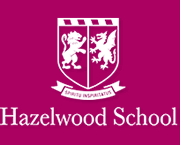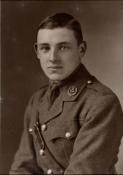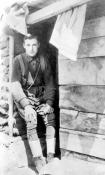
War Memorial
| Captain Marcus Herbert GOODALL | |
|
1/5th Battalion York and Lancaster Regiment Date of birth: 27th June 1895 Date of death: 14th July 1916 Died of wounds aged 21 Buried at Puchevillers British Cemetery Plot I Row B Grave 55 |

|
| Marcus Herbert Goodall was born at Tickhill in Yorkshire on the 27th of June 1895 the second son of the Reverend Canon John William Goodall, Vicar of Tickhill, and Clara Isabel (nee Wilks) Goodall of The Vicarage, Rotherham in Yorkshire. He was educated at Hazelwood School until December 1908 where he was a member of the Choir. He was a member of the Cricket XI in 1907 and 1908 and a member of the Football XI in 1908. The school magazine wrote the following on his 1907 cricket season: - "Very plucky and hardworking in the field; his batting is rustic to a degree, but his bowling, though "green" at present, is quite likely to be of service next season." Of his 1908 cricket season they wrote: - "His ability in the field is as strong an asset as ever, but neither as batsman nor trundler has he reached the level we had prophesied for him." They wrote the following of his 1908 football season: - "(Outside left) - "An uncertain player - quite brilliant on his day, but anon sinking to mediocrity; apt to finish weakly after apparently beating down all opposition." On leaving the school the magazine wrote the following of him in their edition of April 1909: - "...our Marlborough scholar - had hoped to be with us until the end of July, but to everyone's dismay the public school authorities proved adamant and snapped him up in January. Apart from his brilliant headwork, he was a most valuable asset to the choir and to both our Elevens. His future is opening bright with promise; our only regret is that his first term at Marlborough should have seen him laid low by the prevailing epidemic." He went on to Marlborough College where he was in Mitre House from January 1909 to August 1913. He won the Foundation Scholarship in 1908 and, the later an Open Scholarship. In 1910 he won the Ireland Exhibition; he also served as a Lance Sergeant in the Officer Training Corps and was appointed as a Senior Prefect. On leaving school he was articled to J.H. Cockburn, solicitors of Rotherham. Following the outbreak of war, he was commissioned as a 2nd Lieutenant in the York and Lancaster Regiment on the 14th of August 1914. He embarked for France at Folkestone with his battalion on the 13th of April 1915 and landed at Boulogne the same night. He was promoted to Temporary Lieutenant on the 10th of June 1915. On the 8th of September 1915 the 1/5th Battalion York and Lancaster Regiment entered the front line in the neighbourhood of Malakoff Farm. The weather was very wet with the communication trenches in particular being in a very poor condition. On the 10th of September Marcus Goodall was inspecting a trench when he was hit in the shoulder by a rifle bullet and was evacuated to the Allied Force Base Hospital at Etaples. He embarked for England from Calais on the 18th of September on board the Hospital Ship "Cambria" and landed at Dover the next day. A Medical Board sat at Caxton Hall in London on the 23rd of October 1915 to report on his case: - "On the date and at the pace indicated this officer was wounded by a rifle bullet which entered the top of the right shoulder above collar bone in front and passed through the muscle and emerged at the back at a distance of four inches from entrance. Exit wound healing, entrance wound healed." Dr A. Gordon Reid of Chatham House, Rotherham wrote, in a letter to the War Office: - "I certify that on Nov. 6 1915 I carefully examined Lieutenant M.H. Goodall 1/5th York and Lancaster Regt. I found him to be suffering from loss of appetite, lassitude and derangement of his nervous system. There were instances of loss of control of his muscles, abnormal attacks of perspiring and tendency to hyper sensitiveness to certain noises." At a Medical Board which sat at the 3rd Northern General Hospital, Sheffield on the 23rd of December 1915 it was concluded that: - "The wounds are soundly healed and he has completely recovered." He was promoted to Captain on the 8th of February 1916 and returned to duty the same month. He attended the 4th Army School at Flixecourt in April 1916 and while there became firm friends with Siegfried Sassoon who was also on a course. Marcus Goodall is referred to in Sassoon’s book “Memoirs of an Infantry Officer” as the character “Allgood”. Sassoon wrote of him: - "Allgood was quiet, thoughtful and fond of watching birds. Allgood never grumbled about the war, for he was a gentle soul, willing to take his share in it, though obviously unsuited to homicide. But there was an expression of veiled melancholy on his face, as if he were inwardly warned that he would never see his home in Wiltshire again. A couple of months afterwards I saw his name in one of the long lists of killed, and it seemed to me that I had expected it." On the 4th of July 1916 the battalion was at Aveluy Wood on the Somme and the war diary records that at 11.30 am a heavy barrage opened by both sides. Later that day Marcus Goodall led a party of twenty men out into no man’s land for a raid on the enemy trenches. He was wounded as he cut the enemy wire along with another man. Private Walter Hutchinson of the battalion wrote in his diary: - "One of the officers ran up and asked for a drink of water. One or our lads handed him a bottle and after he had regained his breath he told us that Captain Goodall had been badly wounded and there was a stretcher sent down at once." He was rescued by Lance Sergeant E.E. Crummock who was awarded the Distinguished Conduct Medal for his work in rescuing wounded men that day. Crummock’s medal was posted in the London Gazette of the 22nd of September 1916 and the citation reads:- “For conspicuous gallantry while carrying wounded under fire, both by day and night. On one occasion he rendered very gallant service with his machine gun.” Marcus Goodall was taken to Puchevillers where he was treated by staff of the 3rd and 44th Clearing Stations but he succumbed to his wounds nine days later. On his death Siegfried Sassoon wrote the unpublished work “Elegy: for Marcus Goodall” His Divisional Commander wrote:- “He was a very gallant officer and his coolness and courage under fire were very noticeable. Had he lived he would have almost certainly been awarded the Military Cross. The serious wound he received last September did not affect his nerve in any way and he was just as fine an example to those under him after he rejoined the battalion as he was before he was first wounded. His brother officers and his men feel his death very much. I think it may be some small comfort to you to know what a fine reputation your son had.” His Lieutenant Colonel wrote;- “Your son distinguished himself by voluntarily going on a most dangerous patrol, and when he was wounded he was in the act of cutting the German wire.” The epitaph on his grave reads: - "Tell England that we who died serving her rest here content." |
|
 | |
| Went on to Marlborough College |
Back